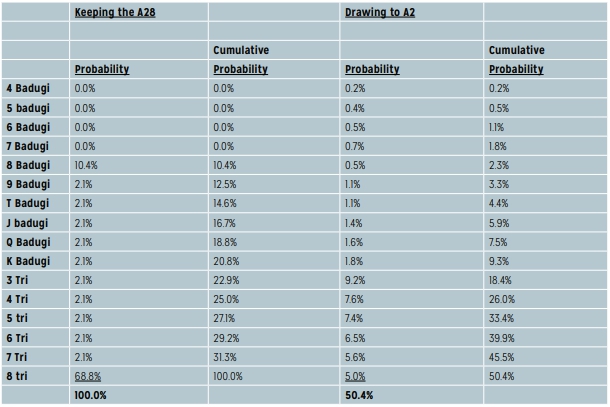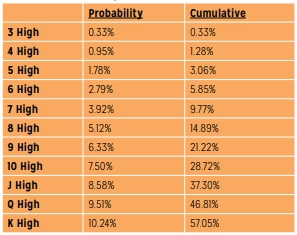






Badugi: Three-Card Badugisby Kevin Haney | Published: May 06, 2020 |
|
|
Three-card badugis, otherwise known as tri hands, are the bread and butter hands of badugi. It is very rare to be dealt a strong badugi, thus the majority of the profit to be made in badugi come from strong three-card badugis such as A 3
3 4
4 . These hands make very strong badugis offering implied odds and also have the ability to take down pots without improvement.
. These hands make very strong badugis offering implied odds and also have the ability to take down pots without improvement.
Weaker tri holdings such as 2 3
3 8
8 also have value, perhaps more than many players realize. It can make a smooth eight badugi right away and the times your opponent started with a badugi this holding is almost certainly best and should be raised for value. In addition to making a badugi right away there are several other improving cards (the 4
also have value, perhaps more than many players realize. It can make a smooth eight badugi right away and the times your opponent started with a badugi this holding is almost certainly best and should be raised for value. In addition to making a badugi right away there are several other improving cards (the 4 , 5
, 5 , 6
, 6 , and 7
, and 7 ) that will “reduce your incomplete,” possibly giving you the best hand.
) that will “reduce your incomplete,” possibly giving you the best hand.
There is often a debate amongst badugi players who don’t consider the 2 3
3 8
8 to be a one-card draw (D1). They feel it is optimal to initially draw two (D2) to the 2
to be a one-card draw (D1). They feel it is optimal to initially draw two (D2) to the 2 3
3 in order to improve their odds of making a strong three-card holding.
in order to improve their odds of making a strong three-card holding.
The A28 versus A2 Debate
Suppose we are dealt A 2
2 8
8 , is it best to play this holding as a D1 or a D2? To help guide us in our decision making we should compare the improvement distributions on the first draw and see if we can draw any conclusions:
, is it best to play this holding as a D1 or a D2? To help guide us in our decision making we should compare the improvement distributions on the first draw and see if we can draw any conclusions:

The most important takeaways appear to be the following:
When drawing to the A 2
2 we will only improve to an eight tri or better around 50 percent of the time. This has implications regarding realization of equity as we may not be able to profitably continue on in the hand unimproved.
we will only improve to an eight tri or better around 50 percent of the time. This has implications regarding realization of equity as we may not be able to profitably continue on in the hand unimproved.
Comparing the distribution of A 2
2 8
8 against A
against A 2
2 it appears that we have roughly the same probability of making a four high tri or better. With A
it appears that we have roughly the same probability of making a four high tri or better. With A 2
2 8
8 there is an approximate 25 percent chance of making an A
there is an approximate 25 percent chance of making an A 2
2 4
4 (or better) while for A
(or better) while for A 2
2 it is only a smidge higher at 26 percent.
it is only a smidge higher at 26 percent.
However, given that we make an A-2-4 or better the A 2
2 8
8 will make a badugi more than twice as often and overall has a stronger distribution.
will make a badugi more than twice as often and overall has a stronger distribution.
Drawing to the A 2
2 allows us a greater chance to reduce to five, six, or seven high tris which is something to consider, however, this improvement may not put you in the lead.
allows us a greater chance to reduce to five, six, or seven high tris which is something to consider, however, this improvement may not put you in the lead.
It’s reasonably close, but in position against an opponent that is either a D1 or a D2, it appears better to draw to the A 2
2 8
8 . We will more often realize our equity and in general have a stronger range when improving.
. We will more often realize our equity and in general have a stronger range when improving.
If we had gotten reraised and our opponent stood pat, then drawing one is clearly the better option. It is very rare for our opponent to have a premium badugi and we fare much better as a D1:
A♦ 2♥ 8♣ (41%) vs. J♦ 10♠ 8♥ 4♣
A♦ 2♥ (25%) vs. J♦ 10♠ 8♥ 4♣
Not only is our “hot/cold” equity much higher, we can always continue on in the pot with A 2
2 8
8 but will often need to fold A
but will often need to fold A 2
2 when we do not get quick improvement.
when we do not get quick improvement.
If we are out of position and don’t know whether or not our opponent is pat, we should always draw one.
Distribution and Opens of Tri Hands
We are dealt a three-card badugi around 57 percent of the time with the complete distribution as follows:

A seven tri or better is usually playable from any position at the table. Some players have advocated that a rougher seven like 4 6
6 7
7 should be folded from early position in six-handed game, however, if we did fold hands such as these we would either be playing too few hands from upfront or we would be filling the void with holdings that will often perform worse in a variety of situations.
should be folded from early position in six-handed game, however, if we did fold hands such as these we would either be playing too few hands from upfront or we would be filling the void with holdings that will often perform worse in a variety of situations.
For example, if we open and get reraised we would much rather have the 4 6
6 7
7 instead of either Q
instead of either Q 10
10 8
8 2
2 or A
or A 2
2 . Holding the latter two hands we are in terrible shape against a pat hand such as 10
. Holding the latter two hands we are in terrible shape against a pat hand such as 10 9
9 8
8 4
4 . The 4
. The 4 6
6 7
7 is also an underdog to that holding; however, it has around 39 percent equity in addition to mostly implied odds. Q
is also an underdog to that holding; however, it has around 39 percent equity in addition to mostly implied odds. Q 10
10 8
8 2
2 is drawing dead (unless broken) while A
is drawing dead (unless broken) while A 2
2 only has 21 percent equity and must improve early on the hand in order to realize it.
only has 21 percent equity and must improve early on the hand in order to realize it.
Against A 3
3 5
5 a pat Q
a pat Q 10
10 8
8 2
2 has around 58 percent equity but as discussed in an earlier issue this situation has definite reverse implied odds. A
has around 58 percent equity but as discussed in an earlier issue this situation has definite reverse implied odds. A 2
2 has approximately 33 percent equity but generally needs to improve to call the turns.
has approximately 33 percent equity but generally needs to improve to call the turns.
While this is also not a great development for 4 6
6 7
7 it does have a decent amount of equity (35 percent) and can make a strong badugi quickly which will result in a profitable check-raise.
it does have a decent amount of equity (35 percent) and can make a strong badugi quickly which will result in a profitable check-raise.
Opening with 4 6
6 7
7 is somewhat akin to opening a hand A
is somewhat akin to opening a hand A 10
10 from UTG in six-max limit hold’em. Running into better hands happens in every game; however, when compared with badugi the situation is probably worse in hold’em. When running into dominating holdings such as A
from UTG in six-max limit hold’em. Running into better hands happens in every game; however, when compared with badugi the situation is probably worse in hold’em. When running into dominating holdings such as A K
K or Q
or Q Q
Q we usually have less than 30 percent equity and more than likely reverse implied odds due to the times we are “lucky” to pair and it’s no good.
we usually have less than 30 percent equity and more than likely reverse implied odds due to the times we are “lucky” to pair and it’s no good.
Select three card eights are also playable from the first two positions, however, with these holdings it is very important that the first two cards are very smooth. We can play a hand such as 2 3
3 8
8 but should muck 2
but should muck 2 7
7 8
8 . The ability to reduce is very important; for example, against 4
. The ability to reduce is very important; for example, against 4 5
5 6
6 the 2
the 2 3
3 8
8 has approximately 42 percent equity while 2
has approximately 42 percent equity while 2 7
7 8
8 only has around 37 percent. Only from the cutoff position and later should we begin to open the rough eights.
only has around 37 percent. Only from the cutoff position and later should we begin to open the rough eights.
On the button we can play rough nine high tris, for example if we have 5 7
7 9
9 we can bring it in for raise and see what happens in the hand. Plan A is to win the blinds uncontested; Plan B is to make a badugi on the first draw; and Plan C with this particularly bad draw would often entail turning it into a “snow.”
we can bring it in for raise and see what happens in the hand. Plan A is to win the blinds uncontested; Plan B is to make a badugi on the first draw; and Plan C with this particularly bad draw would often entail turning it into a “snow.”
Snowing is the act of staying pat with a busted draw and betting the hand through in the hopes that the villain folds before showdown. There will be much more discussion on snowing in future articles, however, the most important principle is that we should turn only the very worst of our draws into these bluffs.
If instead we have a holding such as 2 3
3 9
9 on the button our plan should be to open the pot and almost always play it is a two card draw. The one exception would be the times we get reraised and out opponent is pat. In this situation our opponent will largely be playing his entire badugi range thus we should draw to the nine. In the next issue we will have a lot more to say on the topic of playing two-card draws. ♠
on the button our plan should be to open the pot and almost always play it is a two card draw. The one exception would be the times we get reraised and out opponent is pat. In this situation our opponent will largely be playing his entire badugi range thus we should draw to the nine. In the next issue we will have a lot more to say on the topic of playing two-card draws. ♠
 Kevin Haney is a former actuary of MetLife but left the corporate job to focus on his passions for poker and fitness. He is co-owner of Elite Fitness Club in Oceanport, NJ and is a certified personal trainer. With regards to poker he got his start way back in 2003 and particularly enjoys taking new players interested in mixed games under his wing and quickly making them proficient in all variants. If interested in learning more, playing mixed games online, or just saying hello he can be reached at [email protected].
Kevin Haney is a former actuary of MetLife but left the corporate job to focus on his passions for poker and fitness. He is co-owner of Elite Fitness Club in Oceanport, NJ and is a certified personal trainer. With regards to poker he got his start way back in 2003 and particularly enjoys taking new players interested in mixed games under his wing and quickly making them proficient in all variants. If interested in learning more, playing mixed games online, or just saying hello he can be reached at [email protected].
Features
The Inside Straight
Strategies & Analysis